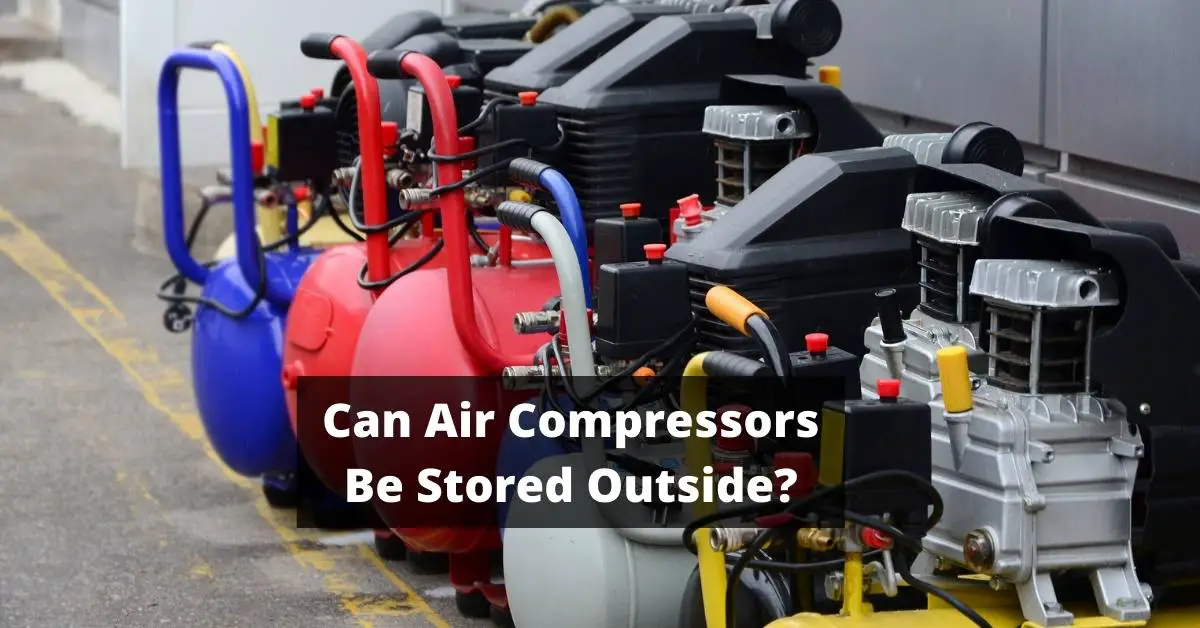I recently noticed that there was oil in my air compressor tank, and I became curious about why this was happening. After conducting some research, I discovered that there are several reasons why oil can accumulate in an air compressor tank.
In this article, I will share what I’ve learned so you can understand the causes of oil in your air compressor tank as well. As a homeowner or DIY enthusiast, you may be using an air compressor to power various tools and equipment. But if you notice oil in your air compressor tank, it’s important to understand the potential effects it can have on your tools and projects.
By understanding the causes and effects of oil accumulation in your air compressor tank, you’ll be able to take appropriate measures to prevent it from happening again. So let’s dive into the details!
Understanding the Causes of Oil in Your Air Compressor Tank
Discovering the reasons for oil buildup in your compressor’s tank can be frustrating, but understanding the causes will help you prevent future issues.
One of the main reasons why there’s oil in your air compressor tank is due to an overfilled oil level. When you add too much oil to your compressor, it can cause excess pressure and eventually lead to leaks. This can result in a buildup of oil in the tank.
Another reason for oil buildup could be due to worn piston rings or valve seals. If these parts aren’t functioning properly, they can allow oil to leak into the compression chamber and eventually make its way into the tank. To avoid this issue, it’s important to inspect these parts regularly and replace them if necessary.
Lastly, another common reason for oil in an air compressor tank could be due to a clogged crankcase breather. A clogged breather prevents proper ventilation, which results in increased pressure and ultimately pushes excess oil into the tank. Regular maintenance, including cleaning or replacing any clogged breathers, can help prevent this issue from occurring.
Understanding these causes of oil buildup in your compressor’s tank is crucial for maintaining proper function and preventing future problems. In addition, being aware of how this affects your equipment is important as well, which we’ll discuss further in the next section about "the effects of oil in your air compressor tank".
The Effects of Oil in Your Air Compressor Tank
You’ll notice some negative effects if oil gets into your air compressor tank, including decreased efficiency and potential damage to your tools. The presence of oil in the tank can cause the air filter to become clogged, which will reduce the flow of air through the system. This means that your compressor will have to work harder to achieve the same level of output, resulting in increased energy consumption and higher operating costs.
Additionally, if oil is present in your compressor tank for an extended period of time, it can start to corrode and damage the internal components of your tools. This can lead to premature wear and tear on important parts such as valves, seals, and pistons. Over time, this damage can become severe enough that you may need to replace expensive equipment or even purchase a new compressor altogether.
Regular maintenance and inspection are essential for preventing these negative effects from occurring. By keeping your compressor clean and well-maintained, you can ensure that it operates at peak efficiency and avoid costly repairs down the line. It’s important to schedule regular maintenance checks with a qualified technician who can identify any potential issues before they become major problems.
So, if you want to keep your compressor running smoothly for years to come, make sure you stay on top of its maintenance needs!
Regular Maintenance and Inspection
To ensure peak efficiency and avoid costly repairs, it’s crucial that you keep your compressor clean and well-maintained by regularly inspecting and performing maintenance checks.
One of the most important steps in preventing oil buildup in your air compressor tank is to change the oil on a regular basis. Over time, oil can become contaminated with dirt, dust, and other debris, which can lead to clogs in the system.
Another important step in maintaining your air compressor is to check for any leaks or cracks in the hoses or tanks. Even small leaks can cause a buildup of moisture and oil in the system, leading to reduced performance and potential damage over time.
Regular inspections should also include cleaning out any filters or screens that may have become clogged with dirt or debris.
By keeping up with regular maintenance checks and inspections, you can help extend the life of your air compressor while avoiding costly repairs down the line.
However, if you find that your current model is no longer meeting your needs or requires frequent repairs despite proper maintenance, it may be time to consider upgrading your equipment to a newer model with more advanced features and capabilities.
Upgrading your air compressor can not only improve performance but also provide peace of mind knowing that you have reliable equipment to rely on for years to come.
Upgrading Your Air Compressor
Looking to improve your compressor’s performance and have peace of mind? Have you considered upgrading to a newer model with advanced features and capabilities?
Upgrading your air compressor could be just what you need to solve the problem of oil in your tank. Newer models come equipped with features such as improved filtration systems, which can help reduce oil contamination in the compressed air.
In addition, upgrading your air compressor can also lead to increased efficiency and productivity. Modern compressors are designed to operate at higher pressures, which means they can deliver more compressed air per unit of time. This means that you can run more tools simultaneously without sacrificing performance or quality.
Finally, an upgraded compressor may have additional safety features built-in. For example, some models come equipped with automatic shut-off valves that prevent over-pressurization or overheating. This extra layer of protection not only keeps you safe but also protects your equipment from damage due to failure.
With these benefits in mind, it’s clear that upgrading your air compressor is a smart investment for any professional or DIYer looking for better performance and reliability. However, even with a newer model, oil contamination is still possible.
In the next section, we’ll explore some effective techniques for removing oil from your compressed air system.
Oil Removal Techniques
If you want to ensure clean and efficient compressed air, consider implementing some of these techniques for getting rid of unwanted contaminants.
One method is using an oil/water separator. This device separates the oil from the water that has accumulated in the tank. The separated oil can then be drained out of the tank, leaving only clean compressed air behind.
Another technique involves using a coalescing filter which captures tiny particles of oil and other contaminants as they pass through it.
Additionally, another way to remove oil from your compressor’s tank is by draining it regularly. Oil tends to accumulate at the bottom of your tank, so you should periodically drain it out before it gets too full and begins to affect your compressor’s performance.
A useful tip when draining is to tilt your compressor slightly towards its drain valve, allowing all the accumulated debris and liquids to flow out easily.
In conclusion, these simple techniques can help maintain clean air in your compressor’s tank, ensuring maximum efficiency while prolonging its lifespan. However, prevention is always better than cure when it comes to equipment maintenance.
In the next section, we’ll look at some tips on how you can prevent oil buildup in your air compressor’s tank altogether.
Prevention Tips
As a compressor owner, I’ve learned that proper storage is crucial to keeping my machine in top condition. It’s important to store it in a clean and dry area, away from extreme temperatures and moisture.
Another key tip is to avoid overheating by not running the compressor for extended periods of time or using it beyond its capacity.
Lastly, regularly checking for leaks can prevent further damage and ensure that your compressor runs smoothly. By following these prevention tips, you can extend the lifespan of your compressor and prevent costly repairs down the line.
Storing Your Compressor Correctly
To ensure your compressor remains in peak condition, it’s crucial that you store it correctly. This means finding a cool and dry place to keep it away from any moisture or extreme temperatures.
It’s also important to drain the tank after each use and before storing it for an extended period of time. Leaving any amount of water in the tank can lead to rust formation, which can cause damage to the compressor and even result in oil contamination.
Another thing to consider when storing your air compressor is covering it with a protective cover. This will help prevent dust, debris, and other contaminants from entering the unit while not in use.
By following these simple storage techniques, you’ll be able to extend the life of your air compressor and prevent oil contamination in your tank. Now let’s move on to our next step: avoiding overheating by maintaining proper ventilation around your compressor unit.
Avoiding Overheating
Make sure you maintain proper ventilation around your compressor unit to avoid overheating, as the old saying goes, "where there’s smoke, there’s fire."
Overheating can cause oil to seep into your air compressor tank. When the unit runs too hot, it can break down the oil and create carbon deposits that will clog up the valves and filters within the compressor system.
To prevent this from happening, make sure you give your compressor enough space for air to circulate. Keep it at least three feet away from walls or obstructions.
Also, check that your intake filter is clean and not blocked by debris or dust. Regularly checking for leaks is another important step in maintaining a healthy compressor system.
Regularly Checking for Leaks
Regularly checking for leaks in your compressor system is crucial to ensuring its longevity and preventing potential disasters. Even small leaks can lead to significant problems down the line, such as oil buildup in your air compressor tank. When there’s a leak, compressed air may escape from the system, causing it to work harder than necessary. This extra strain can cause overheating, which could damage both the compressor and any tools attached to it.
To check for leaks in your system, listen for any hissing sounds or feel around fittings and connections for escaping air. You can also use soapy water on each connection point and wait for bubbles to appear where there is a leak. Regular checks like these will help you catch any issues early on before they become major problems that require professional assistance.
When it’s time to seek professional help with your compressor system, there are certain indicators that suggest it’s time to call in an expert technician.
When to Seek Professional Help
When I experience problems with my air compressor, I first try to troubleshoot the issue on my own. However, there are times when I know it’s best to call in a professional technician for help.
In this subtopic, we’ll discuss common issues that may arise and the signs that indicate it’s time to seek expert assistance.
Troubleshooting Common Issues
If you’re experiencing oil buildup in your air compressor tank, it’s important to troubleshoot the root cause of the issue to prevent damage and ensure proper functionality. One common reason for oil buildup is a worn piston ring or cylinder wall, which allows oil to leak into the compressed air. Check these components for wear and tear and replace them if necessary.
Another possible cause of oil buildup is a dirty or clogged air filter. When the filter becomes clogged with dirt and dust, it can no longer effectively remove contaminants from the air before it enters the compressor tank. This can lead to increased oil consumption and buildup. Make sure to regularly clean or replace your air filter to prevent this issue from occurring.
By troubleshooting these common issues, you may be able to resolve your oil buildup problem without needing professional help. However, if you’re still experiencing issues even after taking these steps, it may be time to call in a technician for further assistance.
Knowing When to Call a Professional Technician
Don’t let a malfunctioning air compressor hold you back – sometimes it’s best to enlist the expertise of a professional technician.
While there are certain issues that can be easily fixed by following troubleshooting guides, some problems may require more advanced knowledge and tools. Attempting to fix these issues on your own could lead to further damage or even injury.
A professional technician has the experience and training needed to diagnose complex problems and provide effective solutions. They have access to specialized equipment and can ensure that repairs are done correctly, preventing future issues from arising.
By calling in a professional, you can save yourself time, money, and frustration in the long run while ensuring optimal functionality of your air compressor.
Conclusion
Well, that was quite an eye-opener! I never imagined there could be oil in my air compressor tank. It’s amazing how such a simple thing can have such a big impact on the machine’s functioning.
The good news is, with regular maintenance and inspection, it’s possible to prevent this from happening. However, sometimes the best preventive measures fail, and you end up with oil in your tank.
That’s when you need to take decisive action. This situation reminds me of a time when I was stuck in traffic for hours on end. All around me were cars honking and people yelling out their windows. It was chaos! But then I noticed one man who seemed completely unfazed by it all.
He had his headphones on and was dancing along to his music without a care in the world. That moment taught me that no matter how chaotic things may seem, it’s important to stay calm and focused on what really matters.
In the case of an air compressor tank with oil, what matters is getting it cleaned out so your machine can work properly again. So if you find yourself dealing with oil in your air compressor tank, remember to stay calm and take action quickly.
With the right techniques and preventive measures, you can keep your machine running smoothly for years to come!



